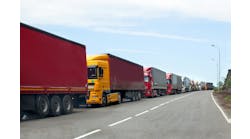As often happens, commercial dynamics move faster than changes to the law and outmoded but still existing laws end up being applied to logistical arrangements never contemplated when the laws were enacted.
“3PL”, “4PL”, “Logistics Provider”, “Freight Expeditor”, “Consolidator”, etc.; the terms are many and varied. One problem, however, is that none are recognized in any statute. When the current legal framework was created such entities did not exist. The laws and regulations refer to and impose certain obligations on rail carriers, ocean carriers and brokers.
When serious issues do arise and legal action is instituted, the type of entity involved can be very important in resolving the dispute. Entities such as 3PLs, Logistics Providers, etc. are legally usually functioning as brokers. The term “broker” is recognized by statute. Brokers are required to be registered with the Federal Motor Carrier Safety Administration (FMCSA) part of the US Dept. of Transportation, carry insurance and follow certain regulations.
Before dealing with third parties it is advisable to check with the FMCSA to determine if the party is a currently registered broker (www.USDOT/FMCSA.gov).
A major issue in domestic transportation involving brokers is their extent of liability for lost or damaged goods. Brokers are not carriers and do not physically transport cargo. They arrange for carriers to perform this function. If you arranged for a broker (no matter what it may actually call itself) to handle pickup and delivery of your goods and something goes wrong can you make the broker legally liable?
The law on this issue is somewhat confused. The US Supreme Court, almost 100 years ago, said motor carriers, rail carriers and domestic freight forwarders are liable for the value of lost and damaged goods under the Carmack Amendment to the Interstate Commerce Act. There is not a lot of legal confusion with respect to the liability of such carriers. Broker liability is another story.
The courts have held that because brokers are not legally defined as carriers they were not liable for loss or damage to goods because of the Carmack Amendment. This broker defense may be changing as illustrated in a recent decision by a federal court.
The case involved the movement of industrial machinery from California to Illinois. The shipper arranged with Two Brothers Trucking, Inc, which, despite its name, acted as a broker (remember, names do not always tell the whole story) to take care of moving the machinery. The goods arrived damaged and the shipper sued Two Brothers and the carriers involved. Two Brothers asked the court to dismiss the suit on the basis it functioned as a broker not a carrier and applying Carmack to the interstate shipment, it was not liable. The court agreed and dismissed Two Brothers from the suit.
The shipper then filed an amended suit against Two Brothers claiming that it had violated its contract with the shipper to deliver the cargo in good condition. Two Brothers asked the court to dismiss these contractual claims on the basis that they were preempted by federal law, (Carmack). The court declined to dismiss these breach of contract claims holding that while carriers are preempted from state law contract actions brokers are not. The court reasoned that the Interstate Commerce Act imposes relatively few duties upon brokers and makes no grant of liability for loss and damage to cargo upon brokers as it does for carriers. The court said that the Carmack Amendment’s silence as to brokers would not be interpreted as a preemption of state law.
Calderwood is a partner with the law firm of Zuckert, Scoutt & Rasenberger, L.L.P., in Washington, D.C., where he concentrates in transportation matters. He can be reached at [email protected]. This column is designed to provide information of general interest. It cannot substitute for in-depth legal analysis of particular problems. Readers are urged to seek counsel concerning individual situations


